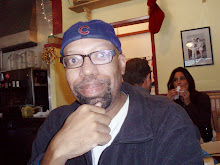 Much hay has been made of the Flub (Literally) Heard 'Round the World, when Supreme Court Chief Justice John Roberts misspoke the presidential oath he was reciting to Barack Obama on Tuesday, causing the new Commander-in-Chief to awkwardly repeat the mistake. Not only did it ruin one of the most important video clips in recent history, but it caused conspiracy theorists and a few pundits into wondering what it all meant. Was Obama in fact the President since he had recited the oath incorrectly? Had Roberts made a Freudian slip, perhaps conscious or unconscious revenge against Obama after the former Illinois Senator had voted against Roberts' confirmation to the Court in 2005? What was it all about, Alfie?
Much hay has been made of the Flub (Literally) Heard 'Round the World, when Supreme Court Chief Justice John Roberts misspoke the presidential oath he was reciting to Barack Obama on Tuesday, causing the new Commander-in-Chief to awkwardly repeat the mistake. Not only did it ruin one of the most important video clips in recent history, but it caused conspiracy theorists and a few pundits into wondering what it all meant. Was Obama in fact the President since he had recited the oath incorrectly? Had Roberts made a Freudian slip, perhaps conscious or unconscious revenge against Obama after the former Illinois Senator had voted against Roberts' confirmation to the Court in 2005? What was it all about, Alfie?To be extra careful, and perhaps to shut up the Drudges of the world, Roberts and Obama did a correct do-over of the oath Wednesday night. And the do-over was welcomed despite the general consensus that Obama became president at noon on Tuesday while Yo-Yo Ma and Itzhak Perlman were jamming on the Capitol steps. (The bungled oath came about five minutes later.) Now Stephen Pinker, a professor of psychology at Harvard University (the alma mater of both Obama and Roberts), as well as the chairman of the usage panel of the American Heritage Dictionary, has written an interesting piece for The New York Times about the incident and how it's not the first time a prominent person has played fast and loose with their words on the world stage.
Pinker compares the Roberts boo-boo with situations like Neil Armstrong's "man" versus "mankind" quotation when he hit the Moon with both feet in 1969, or Princess Diana mixing up the several names of Prince Charles when they married in 1981. (Look how well that union worked out.) He then points out that Roberts is a "famous stickler for grammar", to the point that he once corrected a Bob Dylan lyric ("When you ain't got nothing, you got nothing to use") in a Supreme Court decision. In the case of the presidential oath, which is explicitly written in the Constitution, Pinker wonders if Roberts may have been fighting the machine that is the "split verb":
in which an adverb comes between an infinitive marker like “to,” or an auxiliary like “will,” and the main verb of the sentence.
The line in the oath that goes, "I will faithfully execute the office of President of the United States," would fall under that split-verb rule, and could explain why Roberts, or something inside of him, took it upon himself to "edit" the Founding Fathers by moving the adverb "faithfully" to its proper position at the end of the sentence.
Of course, that doesn't explain Roberts' other major error, when he said "President to the United States". But nobody's perfect, not even a Harvard graduate.




1 comment:
Poor guy--and that goes for both of them. Having recently botched a relatively simple constitutional question while under oath in front of a jury while testifying in a trial last week, I simply cannot imagine what effects knowing that literally millions of people around the world were hanging on your every word might have on one's thought processes. I am certain that the magnitude of the moment was not lost on either. So I would say to those who have taken potshots at the people on both sides of the equation: the view from the cheap seats is a lot different than the view from the stage.
Post a Comment